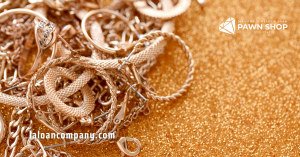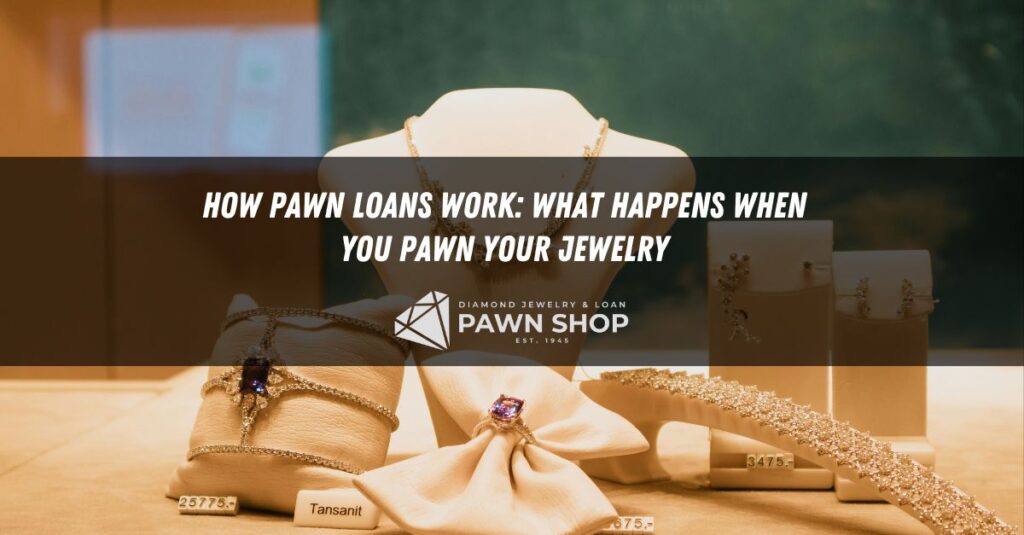Life has a way of throwing unexpected expenses our way. Whether it’s a medical bill, car repair, or urgent home maintenance, sometimes you need cash fast. Traditional loans can take weeks to process, and credit cards might already be maxed out. That’s where jewelry pawn loans come in—a centuries-old solution that’s still helping people today.

If you’ve ever wondered what actually happens when you walk into a pawn shop with your jewelry, you’re not alone. Many people have misconceptions about the pawn industry, often influenced by reality TV shows or outdated stereotypes. The truth is, working with a reputable pawn shop can be a straightforward, legitimate way to get the cash you need while keeping your options open.
Understanding how jewelry pawn loans work can help you make informed decisions during financial emergencies. By the end of this guide, you’ll know exactly what to expect from the process, how interest rates work, and most importantly, how to get your precious items back.
What Is a Pawn Loan?
A pawn loan is a secured loan where you use personal property as collateral. Unlike traditional loans that rely on your credit score and income verification, pawn loans are based entirely on the value of the item you’re pawning. Your jewelry serves as security for the loan, which means the pawn shop can sell it if you don’t repay.
The process is refreshingly simple compared to bank loans. You bring in your jewelry, the pawnbroker evaluates it, and if you accept their offer, you walk out with cash that same day. No credit checks, no lengthy applications, and no waiting periods.
This type of loan has been around for thousands of years. Ancient civilizations used similar systems, and pawn shops have been regulated businesses in America since colonial times. Today, they’re governed by strict federal and state laws that protect consumers.
Step-by-Step: The Pawn Loan Process
Bringing Your Jewelry to the Shop
When you enter a reliable pawn shop, you’ll typically be greeted by knowledgeable staff who understand the value of various items. Bring any documentation you have about your jewelry, such as certificates of authenticity, appraisals, or purchase receipts. While not required, these can help establish the item’s value.
The pawnbroker will examine your jewelry carefully, looking at factors like metal purity, gemstone quality, brand recognition, and current market conditions. They might use specialized tools like diamond testers, scales, and magnifying equipment to assess authenticity and condition.
Getting Your Item Evaluated
Professional pawnbrokers have extensive training in evaluating jewelry. They consider several factors when determining value, which is crucial when offering jewelry pawn loans to customers:
Metal content: Gold, silver, and platinum prices fluctuate daily based on commodity markets. The purity (measured in karats for gold) directly affects value.
Gemstone quality: Diamonds are evaluated using the “4 Cs”—cut, color, clarity, and carat weight. Other precious stones have their own grading systems.
Brand and craftsmanship: Designer pieces from well-known brands often carry premium value beyond their material worth.
Market demand: Popular styles and timeless pieces typically receive higher offers than trendy items with limited appeal.
The evaluation process usually takes 15-30 minutes, depending on the complexity of your pieces.
Making the Deal
Once the evaluation is complete, the pawnbroker will make you an offer. This amount is typically a percentage of the item’s estimated resale value—often between 25% and 60%. Remember, pawn shops need to account for their costs, profit margins, and the risk that you might not repay the loan.
You’re under no obligation to accept the offer. If you decline, you simply take your jewelry and leave. If you accept, you’ll complete some paperwork and receive your cash immediately.
Understanding Interest Rates and Terms
Pawn loan terms vary by state and individual shop policies, but most follow similar patterns. The loan term is usually 30 to 90 days, though some states allow longer periods. During this time, you have several options:
Pay the full amount: Repay the principal plus interest to reclaim your jewelry.
Pay interest only: Extend the loan for another term by paying just the interest portion.
Let it go: Allow the pawn shop to keep your item as full payment for the loan.
Interest rates for jewelry pawn loans are typically higher than traditional bank loans, ranging from 12% to 240% annually depending on your location. However, since these are short-term loans, the actual dollar amount of interest might be reasonable for the convenience and speed of getting cash.
Many states regulate pawn shop interest rates and fees, so reputable shops must operate within legal limits. Always ask about the total cost of your loan upfront, including any additional fees.
Getting Your Jewelry Back
The beauty of pawn loans lies in your ability to reclaim your items. As long as you repay the loan within the agreed timeframe, your jewelry will be returned in the same condition you left it.
Most pawn shops store pawned items securely, often in safes or locked storage areas. Your jewelry should be tagged with your loan information and kept separate from items for sale.
If you can’t repay the full amount by the due date, don’t panic. Many shops offer extensions or renewal options. You’ll typically need to pay at least the interest portion to extend the loan term. This gives you more time to gather the funds needed to reclaim your jewelry.
Communication is key. If you’re having trouble meeting the deadline, contact the pawn shop as early as possible. Many are willing to work with customers who demonstrate good faith efforts to repay.
What Happens If You Don’t Repay?
If you’re unable to repay the loan or extend it, the pawn shop gains legal ownership of your jewelry. They can then sell it to recover their money. This isn’t personal—it’s simply the business arrangement you agreed to when accepting the loan.
The good news is that you’re not responsible for any deficiency if the item sells for less than the loan amount. Unlike some other types of secured loans, you won’t receive additional bills or damage to your credit score. The transaction is complete once the pawn shop takes ownership.
However, if the item sells for more than you owed, some states require pawn shops to return the excess to you. Laws vary significantly, so ask about this possibility when making your loan.
Choosing the Right Pawn Shop
Not all pawn shops operate the same way. When you need cash quickly, it’s still worth taking time to find a reliable pawn shop that treats customers fairly.
Look for shops that are properly licensed and insured. Legitimate pawn shops display their licenses prominently and maintain proper bonding to protect customers. For example, established businesses like Diamond Jewelry and Loan Pawn Shop in Los Angeles are BBB accredited and fully licensed, bonded, and insured, providing peace of mind during transactions.
Customer service matters too. A good pawn shop will explain their processes clearly, answer your questions patiently, and treat you with respect. They should provide clear documentation of your loan terms and store your items securely.
Research the shop’s reputation through online reviews and local business ratings. Word-of-mouth recommendations from friends or family can also guide you toward trustworthy establishments.
Benefits of Pawn Loans
Jewelry pawn loans offer several advantages over other quick-cash options: no credit checks, fast cash, short commitments, and confidentiality.
No credit check required: Your credit history doesn’t matter—the loan is secured by your jewelry.
Fast cash: Most transactions complete within an hour of walking in the door.
No long-term commitment: Short loan terms mean you’re not tied into lengthy payment plans.
Confidential: Pawn transactions are private business dealings between you and the shop.
Regulated industry: Licensed pawn shops operate under strict legal guidelines that protect consumers.
Option to retrieve items: Unlike selling outright, you retain the possibility of getting your jewelry back.
Common Misconceptions
Many people avoid pawn shops due to outdated stereotypes or misconceptions. Modern pawn shops, especially reliable ones, are legitimate businesses that serve their communities professionally.
Pawn shops aren’t just for people in desperate situations. Customers include small business owners managing cash flow, individuals making large purchases who need bridge financing, and people who prefer not to use credit cards or bank loans.
The items in pawn shops aren’t necessarily stolen goods. Reputable shops follow strict regulations about accepting merchandise and work closely with law enforcement to prevent dealing in stolen property.
Making Smart Decisions
Before pawning jewelry, consider whether you truly need the cash or if other options might work better. Could you borrow from family or friends? Do you have other assets you could sell instead?
If you decide to proceed, be realistic about your ability to repay the loan. Only pawn items you can afford to lose permanently, just in case unexpected circumstances prevent repayment.
Consider getting multiple evaluations if you’re pawning particularly valuable pieces. Different shops might offer varying amounts based on their expertise and current inventory needs.

Your Next Steps
Pawn loans can be valuable financial tools when used wisely. They provide quick access to cash without credit checks or lengthy approval processes, while giving you the option to reclaim your jewelry later.
If you’re considering a pawn loan, start by researching reliable pawn shops in your area. Look for businesses with proper licensing, good reputations, and fair dealing practices. Visit a few locations to compare offers and get comfortable with their processes.
Remember that pawn loans work best as short-term solutions for temporary cash needs. With the right approach and a reputable partner, pawning your jewelry can help you navigate financial challenges while keeping your options open for the future.


